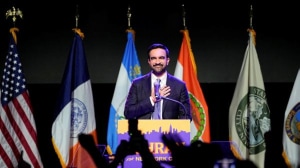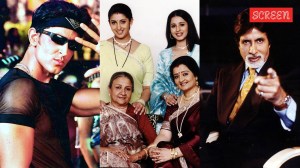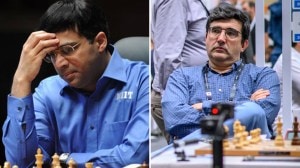‘Tremendous scope to improve Mumbai’s security…in development, watch Gujarat’
Sharad Pawar wears many hats but is satisfied with being called agriculture minister. While speaking to Shekhar Gupta, Editor-in-Chief, The Indian Express, on NDTV 24x7’s Walk the Talk, Pawar tried on all his hats. He admitted to a white lie to prevent communal violence and pointed to Modi’s state as an exemplar of reformist politics

• Sharad Pawarji, how do I describe you? Agriculture Minister? Head of NCP? Chairman of BCCI? What is the most important?
Agriculture Minister is enough. (Laughs)
• And somebody who knows Mumbai as no one else does?
Ya, I know a little bit of Mumbai. Mumbai is not a simple city. But I know this city and I owe this city. This city has given so many things to me, so it is my responsibility to associate with this city in good and bad times.
• But, you know, very often your help has been sought in bad times here. You remember 1993, just after Babri, the riots, bomb blasts. It was your fate then to come and handle the crisis.
Yes. I recollect that when I was the defence minister, one day, I was called by the then Prime Minister Narasimha Raoji, and along with me was our senior colleague Salve sahib. And Narasimhaji spent seven hours to convince me to go to Mumbai because it was facing so many serious problems. The international community was worried about India because they know Mumbai is an important financial place. And if we were to restore the confidence of the investors then we had to normalise Mumbai. So, the then Prime Minister practically physically sent me to Mumbai and I came here on March 6, 1993. And I started improving the situation. The main problem was that there was a major, total, gap between Hindus and Muslims and Mumbai is a known cosmopolitan place, here the question of whether you are Hindu, Muslim, Christian, Parsi, anybody, doesn’t arise…But that cosmopolitan character was practically disappearing in those days. It was our responsibility to see how we would be able to restore that cosmopolitan character. I started working, but I recollect on March 12, I was sitting in Mantralaya and at about 12-12.30 pm I heard a big noise, it was the explosion in Air India’s office. Within ten minutes I got a message that explosions had happened in 11 places, more than 365 people had died. I immediately realised that all these places were essentially dominated by Hindus. I guessed there must be some design, and that design must be that Hindus should react against the minority.
• So, deliberately the explosions were taken out in Hindu areas?
That’s right. I realised that basically the design seems to be that there should be riots. So I straight went on television and I misled people, deliberately misled people, instead of 11 bomb explosions I said 12. And one of the places that I mentioned was Masjid Bandar, an area dominated by minorities. So I spread the message that it’s not only in Hindu areas, it’s in a Muslim area also. I also said that I had seen – because I’d immediately visited the Air India building – and I said I’d visited it and the type of material that had been used was used essentially by some of the southern Indian side terrorist organisations. And I tried to (point a) finger at the Sri Lankan side…
• So that was also deliberately fudged?
That was also deliberately fudged, I wanted to divert the attention from the Muslim angle to other areas. Because the design was to create further problem in Mumbai. Ultimately investigations established ki that was the design…
• …Because, I believe, although the government did not talk about it for good reason but that, before the bomb blasts, automatic weapons had been distributed to a few minority people living in these localities with the expectation that the Hindu community will attack them and they, in self-defence, will then use automatic weapons and cause a lot of casualties which will actually have the city burning. Isn’t it?
That’s right. That was the thinking. There was one more thinking that we got to know about after investigation. That when this type of situation is created, definitely minority suffers and in some minority families you can see some angry youngsters (who) are permanently available for you to create this type of mischief anywhere in the country. So, the idea is to recruit, those who have suffered – select them, catch them, train them and use (them) permanently.
• Did people in the city or friends in the party question you later? That why did you deliberately tell this lie on TV? That Muslims were also attacked when they were not.
Yes. Definitely. In fact, there was an inquiry commission and the issue was raised before Justice Srikrishna. And ultimately Justice Srikrishna understood, he did mention ki that was the correct decision, and we should not worry. What I had done was ultimately in the interest of society, the city, the country.
• That’s the difference between a politician and a mere administrator, isn’t it? Because governance is about politics.
Yes, governance is about politics
• So, looking back on 1993, and looking at the situation now, the city has just had a series of blasts, so polarisation between two communities is back?
To be frank, Mumbai was normal. There was perfect understanding between communities. It had started behaving like a cosmopolitan city. But this time again similar, looks like similar, experiment or what we’ve seen on that particular day in many places…
• …But this time Gujaratis, upper caste Gujaratis, were targeted.
This time also, I am not involved with whatever is happening in the investigation. (But) what I know about Mumbai, and about people who are involved in this type of crime previously – their psyche, their mind is always running. You see there are three type of trains in Mumbai, one is western suburb, second is central and third is the one that goes to the Mumbai Port side. You see, western railway is the only railway where a sizeable middle-class, higher middle-class, trading community, representatives of the stock exchange, of the diamond business…
• …And many Gujaratis…
…Ya, ya, they travel that side. So they selected that train, they did not selected the central railway.
• …So someone who selected this knows the sociology of Mumbai.
That is one. Secondly, you just see, that each compartment of the various trains (in the blast) was only first class. Who travels first class? Those who can afford. You see, you’ll find very few muslims who can afford, very few other sections who are poor who can afford. Essentially, Gujaratis, Marwaris, financially better-off people, all higher salary class, they travel western railway, and first class. So, it was a clear cut design to concentrate on a particular section of people, and simultaneously , might be, that a particular section should not be affected. And again in 10 to 12 minutes.
• Right. Are you satisfied with the way the government handled it afterwards? Because your party has a big stake here.
Firstly, I’ll have to give credit to Mumbai city and its citizens. In fact, I’ll not blame police or anybody. See, because in different places in trains, where so many lakhs and lakhs of people are travelling everyday, it is impossible for any police authority or any law and order authority to…
• …I know Sharadji but there’s a sense in Mumbai, a widespread sense, that under your home minister the police took its eye off the ball, it got involved in too many unimportant things. Closing the dance bars became an izzat ka sawal…
I know Mumbai by and large, I know Mumbai police, the Maharashra police. These are officers with tremendous integrity, capacity and very committed to this city and people and the state. I will not challenge their bonafides.
• …No, no, bonafides of your political leaders, your party’s deputy CM…
I agree, but simultaneously, Mumbai and Maharashtra police and home ministry have a limited role in railway protection. The responsibility is primarily with the railway police.
• Sure. So Sharadji, have you spoken to your home minister. I mean for this city to register an FIR for wardrobe malfunction in a fashion show is ridiculous.
I also don’t approve of this type of thing, and I communicated my feelings also. But I don’t communicate publicly because I don’t want law and order machinery that is supposed to manage these things to be be demoralized.
• But you did counsel him?
Definitely. In fact, this entire issue of Mumbai blast and the way it is (being) handled, I saw that there is tremendous scope to improve. And wherever I think there are easier ways to improve Mumbai’s security, I definitely conveyed. Because ultimately we owe to these people and it is our responsibility. I may not be in the state government but…
• The other thing that’s happening now is that the role of the chief minister, the role of the state government, is becoming very important in India. The party’s future depends on how well it’s doing in the states, that’s where it draws its strength from, isn’t it?
Exactly. You see, till a particular time after Mrs Gandhi, Indira Gandhi’s, days, the union government and union centre leadership was ultimately managing the show of the country. Today it is the union of states. And union of states will ultimately decide the future of this country. I am watching this type of situation in neighbouring state
• In Gujarat?
Yes. I saw that the government is trying its level best to aggressively concentrate on development. Take the case of Narmada, the whole country’s media was writing like this…
• …Except The Indian Express…
…Yes, I have to accept that (laughs). And all NGOs and everybody was abusing the Gujarat government. But if you go to Ahmedabad, anywhere in Gujarat, people are extremely happy. They say, here is a leader who fought for us and who ultimately succeeded.
• Because he’s running a good government. Which is tough to admit…
(Laughs). People of Saurashtra want water. Today for agriculture every villager wants water and the chief minister is fighting for this. Ultimately he got support from Congress also, from the state. I don’t know whether he got support from outside Congress, but our party supported. People like this.
• He’s willing to take tough political decisions in the interest of development?
Whosoever is willing to take tough political decisions in the interest of development, the interest of state, and his own people, might face some initial reaction but ultimately people accept this.
• But that’s where it surprises me. You are a reformer, Maharashtra has produced so many reformist politicians. Still for a state like this, not even abolish the Land Ceiling Act?
Here I’ll blame Congress. Because the Prime Minister is so clear about this. He has said this in my presence to the chief minister and others. My party here is insisting on abolishing land ceiling. I’ve made a public statement on two three occasions…
• …And you’ll make that statement again now, you’ll ask them to abolish?
Yes. And now whatever financial support the government of India is giving to revive the cites, it has put one of the conditions to scrap this urban land ceiling. And that type of decision is not taken here and therefore the state is not getting financial support for cities. And I think it is unnecessary delay, but recently the chief minister told me that he’s going to take a quick decision.
• Did you talk to the government here on this?
I continuously discuss with them. I am trying to convince them. Fortunately, our finance minister here is very pragmatic and he’s a reformist.
• Many of us believe that besides Harkishan Singh Surjeet, you are the only other politician who can pick up the phone and call anybody in any political party and they’ll see you as a practical politician, pragmatic, a conciliator. How do you look at today’s UPA situation? It looks like things are very unstable.
The situation is like this for those who are not in, who are only reading newspapers and watching what is happening in Parliament. They will come to this conclusion. But today this government is made by Dr Manmohan Singh. Each and every member of the UPA is clear about his commitment to the country.
• Right.
You see, you can’t compare Indira Gandhi and Manmohan Singh. She was a political leader too and a party chief . So, she enjoyed the strength of her party. That is not the case with Manmohan Singh. he is not a party head. That’s why that type of difference you have to accept. But as an administrator, as a visionary, a person who understands economics, a person whose honesty, integrity are above all, and very polite, and who tries to build excellent relationships…
• Do you see him as a person who understands foreign policy? India’s national interest?
Yes absolutely. You see a lot of discussion is going on this new deal.
• But you are in broad agreement with his foreign policy?
Definitely I am in broad agreement with his foreign policy.
• Very strong opposition to the deal, does it come from anti Americanism, or does it come from pro Indianism?
I will tell you one thing frankly about the Left. They are very honest with their own thinking. And ideology. I will not challenge their bonafides. Number two they are equally honest and sincere that there should not be instability in this country. Left will be the last party which will create serious problem and a threat to the UPA Government. They will not be responsible for the collapse of the UPA Government. They will insist on their own programme, ultimately they are supporting us. Government is depending on them. They have some ideology, they have some programme. They have every right to insist their own programme.
• But they will not rock the boat?
My own assessment is that they will not rock the boat, and it is our responsibility to explain to them properly as to what we are doing and how it is beneficiary for the country.
• Before I let you go, have you read about John Wright’s book? Do you have any views – for or against?
I saw some write-up on the book. I haven’t read it yet.
• The idea that zonal selectors behave like ‘zonal’ selectors, are you changing the selection system?
If I have to change the zonal system, I have to amend the constitution. And ultimately if I have to amend the constitution, then I have to get support from zonal representatives. (Laughs). So it’s not that easy, but we will see..
• But there is a problem. You think ideally that system should be changed?
These days, you see, the players are get such huge money, whether it is for Ranji Trophy or whether it is for this – so unless and until we select excellent people as selectors, it will not be that easy. Temptations from both sides are quite high.
• So you think ideally the zonal system should be changed
No, I don’t mind even continuing the zonal system, but selection should be changed. It shouldn’t be that if someone’s supporting me, not very knowledgeable, hardly played one or two matches, but because he’s supporting me that is why I am giving him a game – that should not be there.
• Right. Give and take..but that happens.
It happens sometimes.
• So John Wright is not wrong?
(Laughs) I do not fully subscribe to his views, but improvement’s possible.
• You have big responsibilities. Indian farmers, Indian cricket, the city of Mumbai, your party..
Cricket is a temporary responsibility. But the farmer, Mumbai, the country, yes permanently.
• Well Sharadji thank you very much for finding the time.
Thank you. Hope you enjoyed the interview too.


- 01
- 02
- 03
- 04
- 05





























